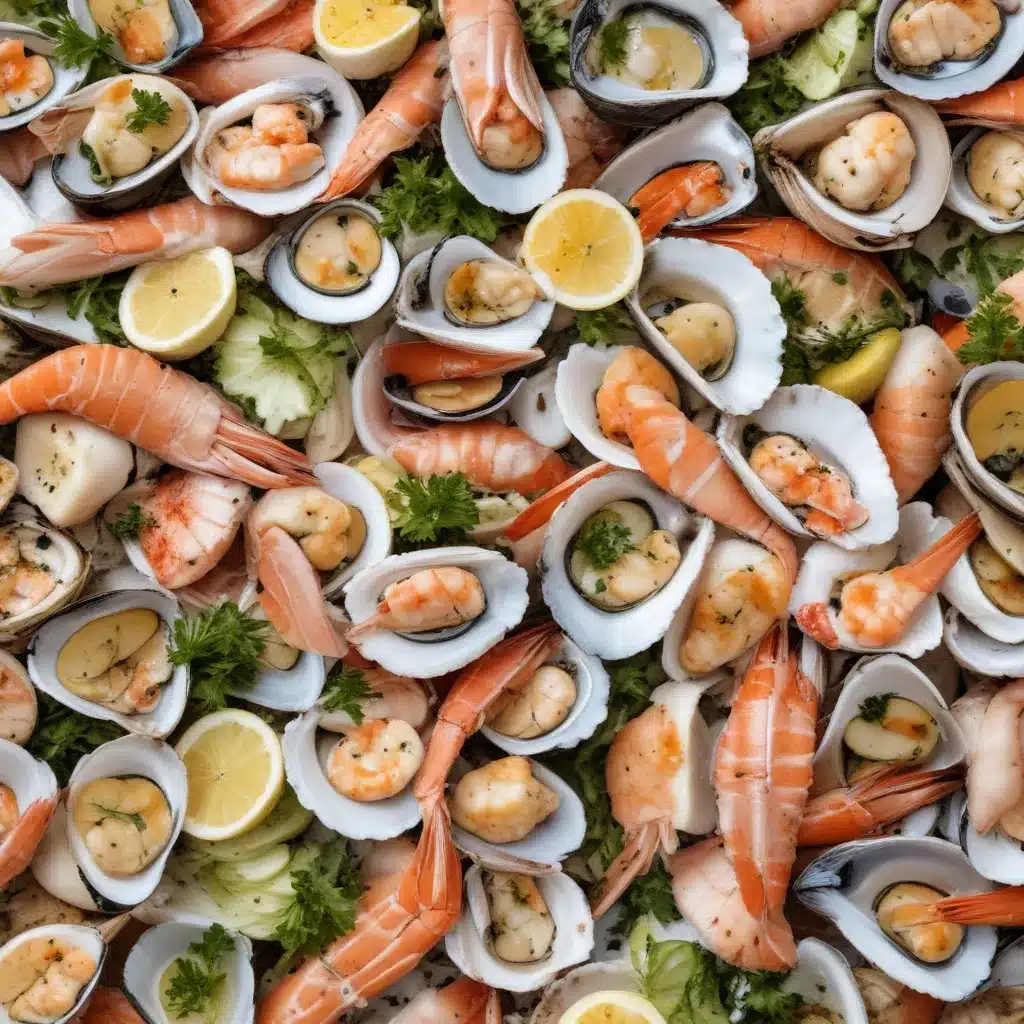
As a seafood dining expert writing for Fish Tales Cafe, I’m excited to dive into the world of ocean-fresh delicacies and uncover their remarkable nutritional benefits. From the firm, flaky fillets of cod to the succulent, briny morsels of shellfish, the sea offers a bounty of culinary and health-boosting treasures.
The Nutritional Value of Seafood
At the heart of seafood’s appeal lies its exceptional macronutrient composition. Fatty fish, such as salmon, mackerel, and sardines, are rich in high-quality proteins and healthy omega-3 fatty acids, which are essential for maintaining cardiovascular health and brain function. Conversely, lean fish varieties, like cod, tilapia, and halibut, provide a lean protein punch while being lower in fat. Shellfish, including shrimp, oysters, and mussels, deliver a unique blend of proteins, vitamins, and minerals that are crucial for overall wellbeing.
Beyond the macronutrients, seafood is a treasure trove of essential vitamins and minerals. Cod, for instance, is an excellent source of vitamin B12, which plays a vital role in red blood cell formation and neurological function. Oysters, on the other hand, are renowned for their high zinc content, a mineral essential for immune system support and wound healing.
Health Benefits of Seafood Consumption
The nutritional prowess of seafood translates directly into tangible health benefits. Numerous studies have demonstrated the cardioprotective effects of consuming omega-3 fatty acids found in fatty fish, which can help lower blood pressure, reduce triglyceride levels, and inhibit the development of atherosclerosis.
Seafood’s anti-inflammatory properties have also been extensively researched, with evidence suggesting that regular consumption can help mitigate the risk of chronic conditions such as arthritis, Alzheimer’s disease, and certain types of cancer. The brain-boosting benefits of seafood are equally compelling, with research linking increased omega-3 intake to enhanced cognitive function, improved memory, and a reduced risk of age-related cognitive decline.
Seafood Varieties and Their Unique Profiles
When it comes to selecting the right seafood for your dietary needs, it’s important to understand the unique nutritional profiles of different varieties. Fatty fish, such as salmon, mackerel, and sardines, are prized for their high omega-3 content and are often recommended for their cardiovascular benefits. Conversely, lean fish choices, like cod, tilapia, and halibut, are lower in fat but still deliver a protein-packed punch.
Shellfish, such as shrimp, oysters, and mussels, offer a distinct nutritional profile, being rich in vitamins and minerals like vitamin B12, zinc, and iron. These marine delicacies can be particularly beneficial for individuals with dietary restrictions or preferences, as many shellfish options are naturally gluten-free.
Sustainable Seafood Practices
As seafood enthusiasts, it’s crucial to consider the environmental impact of our dietary choices. Responsible aquaculture and well-managed wild capture fisheries play a vital role in ensuring the long-term sustainability of our ocean’s resources. Eco-labeling and certification programs, such as the Marine Stewardship Council (MSC) and Aquaculture Stewardship Council (ASC), can help guide consumers towards more sustainable seafood options.
Incorporating Seafood into a Balanced Diet
Integrating seafood into a balanced, nutritious diet can be a delightful and rewarding experience. Whether you’re a seasoned home cook or a culinary adventurer, there are endless ways to incorporate these ocean gems into your meals. From classic pan-seared cod to adventurous ceviche preparations, seafood offers a world of culinary possibilities.
Beyond the classic recipes, consider exploring global seafood traditions, such as Japanese sashimi, Mediterranean cioppino, or Cajun gumbo. Pair your seafood dishes with complementary flavors and textures, and experiment with gluten-free breading or seasoning options to cater to diverse dietary needs.
Potential Concerns and Considerations
While the health benefits of seafood are well-documented, it’s important to be mindful of certain considerations. Mercury contamination, for instance, can be a concern with certain larger, predatory fish. Individuals with seafood allergies or sensitivities should exercise caution and consult with healthcare professionals before incorporating these foods into their diets.
Additionally, the ethical and environmental impact of seafood production is an area of growing concern. Responsible consumers should seek out sustainably sourced and eco-certified seafood options to support the long-term health of our oceans and marine ecosystems.
The Versatility of Seafood in Cuisine
The culinary versatility of seafood is truly remarkable, with its ability to seamlessly integrate into a wide array of global culinary traditions. From the delicate poached salmon of Scandinavian cuisine to the bold, spicy shrimp dishes of Louisiana, the ocean’s bounty has inspired countless vibrant and flavorful preparations.
Beyond the classic preparations, seafood also lends itself beautifully to fusion and innovation. Experiment with sous vide techniques to achieve perfectly cooked halibut, or try your hand at en papillote methods for delicate, aromatic cod fillets. Pair your seafood creations with complementary flavors, such as citrus, herbs, or even wine reductions, to elevate the dining experience.
The Impact of Seafood on Human Health
The profound impact of seafood on human health cannot be overstated. Numerous studies have linked increased seafood consumption to extended longevity and healthy aging, with the omega-3 fatty acids and other essential nutrients playing a crucial role in supporting the cardiovascular system, cognitive function, and immune system.
For expectant mothers and young children, seafood serves as an invaluable source of nutrients critical for fetal development and infant health. The docosahexaenoic acid (DHA) found in many seafood varieties is particularly important for brain and eye development, making seafood an integral part of a balanced, nutrient-rich diet during pregnancy and early childhood.
Whether you’re a seafood connoisseur or simply looking to expand your culinary horizons, the ocean’s nutritional gems offer a world of possibilities. Explore the vast array of seafood options, experiment with diverse preparation methods, and embrace the exceptional health benefits that these marine delicacies have to offer. Bon appétit, and may your culinary adventures be as bountiful as the sea itself!

